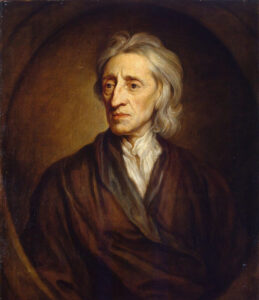John Locke publishes Two Treatises of Civil Government, arguing that men are born with natural rights given to them by God that no government may take away. In chapter 2, paragraph 6; and chapter 11, paragraph 141 he writes:
… The state of nature has a law of Nature to govern it, which obliges every one, and reason, which is that law, teaches all mankind who will but consult it, that being all equal and independent, no one ought to harm another in his life, health, liberty or possessions; for men being all the workmanship of one omnipotent and infinitely wise Maker; all the servants of one sovereign Master, sent into the world by His order and about His business; they are His property, whose workmanship they are made to last during His, not one another’s pleasure. …
· · · · · · ·
… The Legislative cannot transfer the Power of Making Laws to any other hands. For it being but a delegated Power from the People, they, who have it, cannot pass it over to others. … And when the people have said, We will submit to rules, and be govern’d [sic] by Laws made by such Men, and in such Forms, no Body else can say other Men shall make Laws for them; nor can the people be bound by any Laws but such as are Enacted by those, whom they have Chosen, and Authorised to make Laws for them. The power of the Legislative being derived from the People by a positive voluntary Grant and Institution, can be no other, than what the positive Grant conveyed, which being only to make Laws, and not to make Legislators, the Legislative can have no power to transfer their Authority of making laws, and place it in other hands.
[restored 5/29/2021]
Subsequent Events:
Authority:
“Law of the Jungle”
ccc-2point0.com/preface
References:
Robert A. Levy and William Mellor, The Dirty Dozen: How twelve Supreme Court cases radically expanded government and eroded freedom, (New York: Sentinel, 2008), 70.


